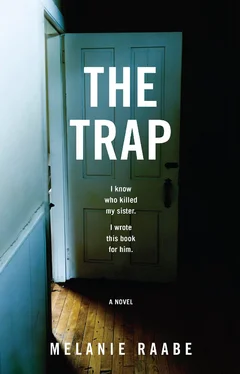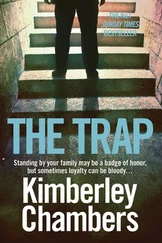I take a deep breath.
“Do you have children?” I ask.
Lenzen groans and buries his head in his hands.
“Please,” he says.
“Do you have children?” I ask again.
“Please leave my daughter out of this,” Lenzen moans. I notice that he’s crying.
“What’s your daughter called?” I ask.
“What do you want from my daughter?”
He says it almost pleadingly. And I suddenly realize. Is it possible that he thinks I mean to harm his daughter in some way? That it’s why I keep asking about her? That it’s a kind of threat? I’d never have come up with that, but all right. I decide to ignore his whining. Maybe he’s ready to give me what I want now.
“You know what I want,” I say.
Give me what I want and I’ll leave your daughter alone, I’m saying between the lines. Lenzen knows that and I know it. I don’t have the time to feel bad about it.
“A confession,” says Lenzen.
The surge of adrenaline, which had flooded my body when Lenzen attacked me, is suddenly back with a vengeance. I feel its heat.
“A confession,” I confirm.
“But I don’t know…”
Here we go again. How long is he going to keep this up?
“Then I’ll help you,” I say. “Where were you living twelve years ago?”
He considers for a moment.
“In Munich,” he says. “That was my last year in Munich.”
“Do you know an Anna Michaelis?” There’s nothing in his eyes — nothing.
“No. Who’s she?”
Liar. I almost have to admire him. Considering there’s a gun involved, he’s holding out pretty damn long. Maybe he really isn’t afraid of death.
“Why are you lying to me?”
“Okay, okay, okay,” he says. “Let me think. The name does ring a bell.”
What kind of a game are you playing, Victor Lenzen?
“I found out during my research that your real surname is Michaelis. Conrads is a nom de plume. After Joseph Conrad, one of your favorite authors, right?”
I’m having trouble keeping my temper. He’s still acting.
“Is Anna Michaelis a relation of yours?” Lenzen asks.
“Where were you on 23 August 2002?” I retaliate.
He looks confused. You could clean pity the man, the way he’s sitting there, bleeding and sniveling.
“Where were you on 23 August 2002?” I repeat. Put him under stress, wear him down, break him.
“Bloody hell, how am I supposed to remember that?” he asks.
“Think about it.”
“I don’t know.” Again he buries his head in his hands.
“Why did you kill Anna Michaelis?”
“What?”
Lenzen leaps up, knocking his chair to the floor. The sudden movement and the clatter make me start. For a moment, I think Lenzen’s going to make a second attempt to attack me, and I too leap up, and back away a few steps. But he only looks at me aghast.
“I want to know why you murdered my sister,” I say.
He looks at me. I look at him. I feel nothing. Everything about me is cold and numb; only the gun in my hand is red hot.
“What?” says Lenzen. “Have you finally…”
“Why did you do it? Why Anna?”
“Oh God,” Lenzen says wearily. He’s reeling.
“You think I murdered your sister,” he murmurs.
He seems dazed. He’s not looking at me anymore; he’s looking at the floor, staring into space.
“I know you did,” I correct him.
Victor Lenzen looks up and stares at me with wide-open eyes. Then, grasping the edge of the table, he turns away from me and breaks into spasms of vomiting. I look at him in horror: he’s bleeding, he’s crying, he’s throwing up.
Lenzen rallies himself. He coughs, gasping for breath, and looks at me, his upper lip beaded with sweat, that curious expression on his face like a child that’s been punished. For a moment, I see a human being instead of the monster and my stomach tightens with pity. I feel his fear — the fear he feels for himself, but more than anything else the fear he feels for his daughter. It’s written all over his face.
That face. I notice again that he has a sprinkling of freckles. I can imagine what he must have looked like as a little boy — before life, before the wrinkles. Interesting wrinkles. I catch myself thinking that I’d like to touch his face, just to know what it feels like. I remember my beautiful grandma and her lovely lined face. Lenzen’s face would feel different beneath my fingers — firmer.
I brush the thought aside. What am I doing? I’m like a child at the zoo who wants to stroke the tiger even though she’s quite old enough to know that it would tear her limb from limb.
Get a grip on yourself, Linda.
I mustn’t let myself get carried away by my pity. Lenzen is retching again.
“You’re a murderer,” I say. Lenzen shakes his head.
I’m perplexed. Either Victor Lenzen has no breaking point, or else…I hardly dare think it through. What if I’d long since reached the point at which Victor Lenzen would break down under pressure? If the only reason he hasn’t yet confessed is that he doesn’t have anything to confess?
No!
I realize how dangerous this train of thought is. I must pull myself together, remember what I learned from Dr. Christensen: that thinking this way might lead to a breakdown. The situation is not only a strain on Victor Lenzen’s nerves but on mine too. I mustn’t budge an inch, mustn’t show any pity and I certainly mustn’t start doubting now. Victor Lenzen is guilty. Everyone has a breaking point; Lenzen just hasn’t yet reached his. He’s used to extreme situations; he said as much himself. Maybe now is the time to offer him the famous way out: a tangible incentive to confess.
“Herr Lenzen,” I say. “If you give me what I want, I promise I’ll let you go.”
He coughs, gasping for breath, then looks at me.
“Give me what I want — and this nightmare will be over,” I say.
I hear him swallow.
“But you want a confession!” he says, turning from me, his hand clutching at his stomach.
“That’s right.”
I know what he’s going to say next: But if I were to confess, you’d shoot me straightaway! Why should I believe you? Of course my only answer to that could be: Right now, you have no alternative, Herr Lenzen.
He says nothing. Then he gives me a steady look.
“I have nothing to confess,” he says.
“Herr Lenzen, you’re not thinking straight. You have two options. Option one: you tell me the truth. That’s all I want. I want to know what happened to my younger sister that night twelve years ago. You tell me — and I’ll let you go. That’s number one. Option two is this gun here.”
Lenzen stares into the muzzle of the gun.
“And,” I add, “my patience won’t hold out forever.”
“Please,” Lenzen says, “you’ve got the wrong man!”
I stifle a groan. How long can he continue to deny it? I decide to change tactics.
“Would you like a tissue?” I ask, taking care to make my voice sound brighter, softer.
He shakes his head.
“A glass of water?” He shakes his head.
“Herr Lenzen, I understand why you’re denying it,” I say. “It must be hard for you to believe that I really will let you go if you tell me what I want to know. That’s perfectly understandable for someone in your position. But it’s the truth. If you tell me what I want to know, I’ll let you go.”
It is quite still again; only Lenzen’s shallow breath can be heard. Standing there, hunched over, he seems a lot smaller.
“I’m not going to lie to you,” I say. “I will, of course, inform the police. But you will leave this house unscathed.”
Now I have his attention. He looks at me.
“I’m not a murderer,” he says. Tears glisten in his eyes. I don’t know whether it’s because of the retching or because he really is on the point of crying again. At this moment, I feel sorry for him, in spite of everything.
Читать дальше












